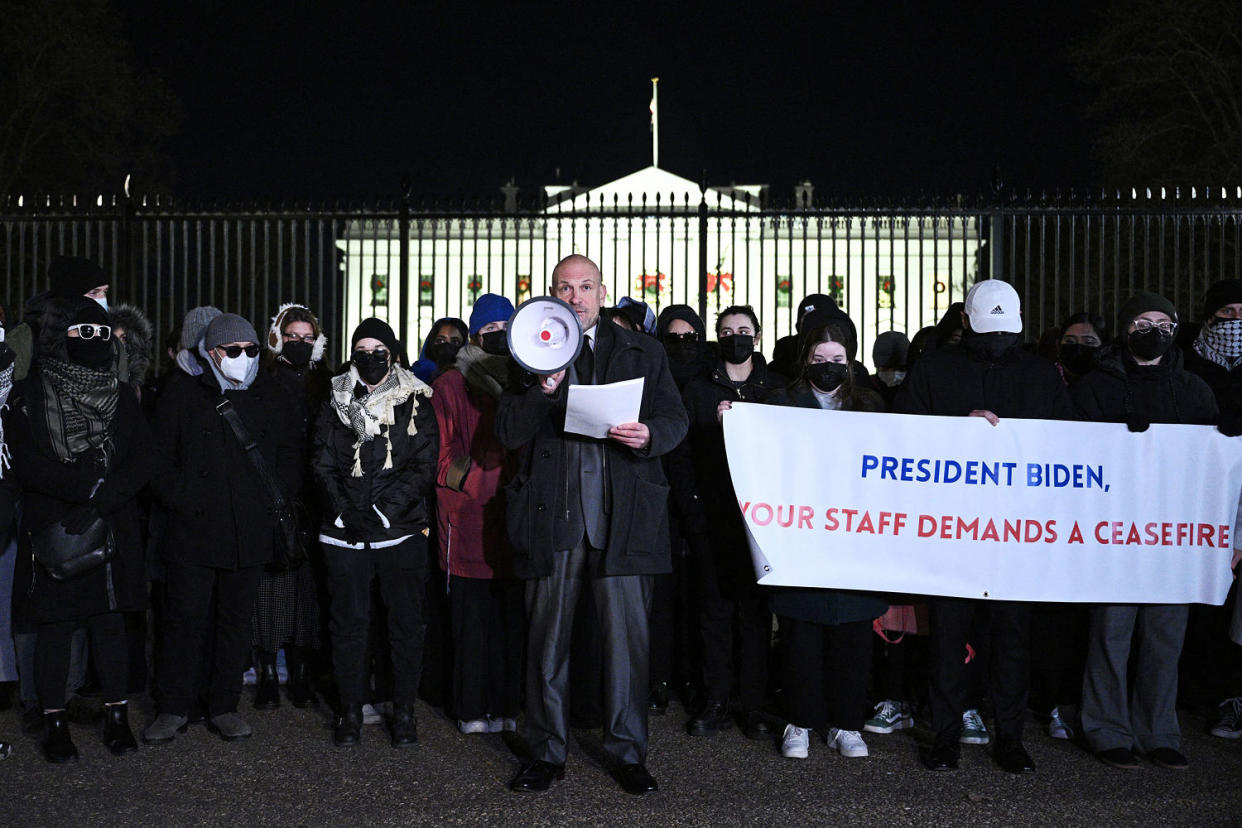Biden’s arms threat to Israel ‘better than nothing’ but too late, say U.S. officials who resigned over Gaza policy
Several former Biden administration officials who resigned over the U.S. approach to Israel's deadly offensive in Gaza say they welcome President Joe Biden's threat to suspend arms shipments as a "step in the right direction."
"It’s better than nothing," said Josh Paul, who served as director of congressional and public affairs for the State Department’s Bureau of Political-Military Affairs for more than 11 years before resigning in late October over what he said was the U.S.'s "blind support" of Israel.
But, he said in a phone interview with NBC News this week, "I think this comes sadly too late for 35,000, if not more people, who have been killed in Gaza — and what we really need is a new policy," adding he believes Washington needs to re-evaluate whether its security assistance to Israel is in the U.S.'s national interest.
A growing number of U.S. staffers, including officials who have worked closely on weapons trade and human rights policy, have resigned over the Biden administration's continued transfer of weapons to Israel for its war in Gaza.
The administration last week paused a weapons shipment, which included 1,800 2,000-pound bombs and 1,700 500-pound bombs, according to a senior administration official, amid concerns over a Rafah assault.
But the U.S. has continued to send military assistance to Israel in the days since, with shipments including both offensive and defensive weaponry, two U.S. officials familiar with the transfers told NBC News. They said the offensive weaponry included small arms.
Hala Rharrit, a U.S. diplomat and veteran foreign service officer who resigned from the State Department last month in protest over the Biden administration's policy on Israel's assault on Gaza, reacted to the president's comments with measured optimism.

"Hopefully this is the start of an actual policy shift that will result in substantial change," Rharrit said in a phone interview Friday, rather than "just a show of, 'we're doing something to try to get them to stop going in, but we're not going to do enough.'"
Annelle Sheline, who resigned from the State Department’s Bureau of Democracy, Human Rights and Labor in March, was less optimistic. “I’m not holding my breath,” she said.
Sheline said she believed Israel was blatantly "in violation of so many laws and has broken so many of these boundaries," often in defiance of public statements from the administration, "that I don't expect we'll actually see a real shift."
'The red line keeps moving'
Their comments come after Biden said during an interview with CNN on Wednesday that the U.S. would stop delivering weapons and artillery shells — including 2,000-pound bombs he said the Israeli military has been using to kill Palestinian civilians — if Israel launched a full-scale attack on Rafah in its bid to eliminate Hamas.
The warning reverberated across Israel, prompting concern and outrage among officials there, with Prime Minister Benjamin Netanyahu saying Thursday his government would "stand alone" if it lost military support from its closest ally and largest overseas weapons supplier.
Rharrit said that while she welcomed Biden's signal that the U.S. was willing to shift policy on the war, as well as the White House's decision to halt an arms transfer last week, she was concerned that "the red line keeps moving."
Israel, she noted, already has boots on the ground in eastern Rafah after ordering the evacuation of some 100,000 people on Monday. And she questioned how the U.S. would choose to define — and react to — a full-scale assault.
Already, the Israel Defense Forces have taken control of the Rafah crossing, where it says it is targeting militant operations in the area. Humanitarian groups say this has prevented aid from entering for days, while video captured by NBC News' crew on the ground shows scenes of death and destruction in parts of Rafah.
Paul, who served in the State Department bureau that oversees U.S. arms sales, noted that the Biden administration missed a deadline Wednesday to deliver a report to Congress on whether Israel has been using U.S. weapons in Gaza in violation of international laws and U.S. policy. Israel launched its offensive in the enclave in response to Hamas' Oct. 7 attacks in which some 1,200 people were killed and 250 others taken hostage.
After Biden on Wednesday said civilians had been killed in Gaza "as a consequence" of bombs sent to Israel "and other ways in which they go after population centers," Paul said he could not "see how that report can't reflect the fact that Israel has indeed been using U.S.-provided weapons to go after civilian areas."

The contents of the report remain unclear, but on Thursday, Axios reported it would provide a highly critical analysis of Israel's conduct in Gaza, but stop short of concluding that is military has violated the terms of use for U.S. weapons. NBC News could not immediately independently verifying the reporting, which cited three unnamed officials.
'I'm sorry that it's taken so long'
The Biden administration has sent thousands of bombs and other munitions to Israel in the course of the war already, and Paul said that even without U.S. military support, "Israel has a deep stockpile of arms and has every ability to continue this operation should it choose to."
But, he said, if the U.S. did shift policy and stop sending arms to Israel indefinitely, "then perhaps it begins to really constrain Israel's ability to use these weapons in Gaza."
Ultimately, Paul said it was “important” that the U.S. has “finally shown willingness to use the leverage that arms transfer provide ... despite their repeatedly having said that they would never do this.”
The U.S. has long been the largest arms supplier to Israel, followed by Germany, a trend that has continued in the midst of Israel's offensive in Gaza, despite Biden himself describing the Israeli forces' bombing of the enclave as "indiscriminate" in December.

"I'm sorry that it's taken so long for the administration to come to this point," Paul said, adding that he hoped the development would open a “much broader conversation” beyond Rafah about the U.S.’s security assistance to Israel, including whether it is “actually in the U.S. national interest.”
After Israeli and Hamas delegations left Cairo this week without a deal to end the fighting in Gaza and secure the release of hostages still being held there, Paul and Rharrit said the U.S. must ramp up the pressure on both parties.
“We as a nation need to put pressure for a diplomatic solution,” Rharrit said. “If we leverage our military aid it could influence significantly Israel to make concessions to stop the war.”
“More bombs, more killings is not the answer."
